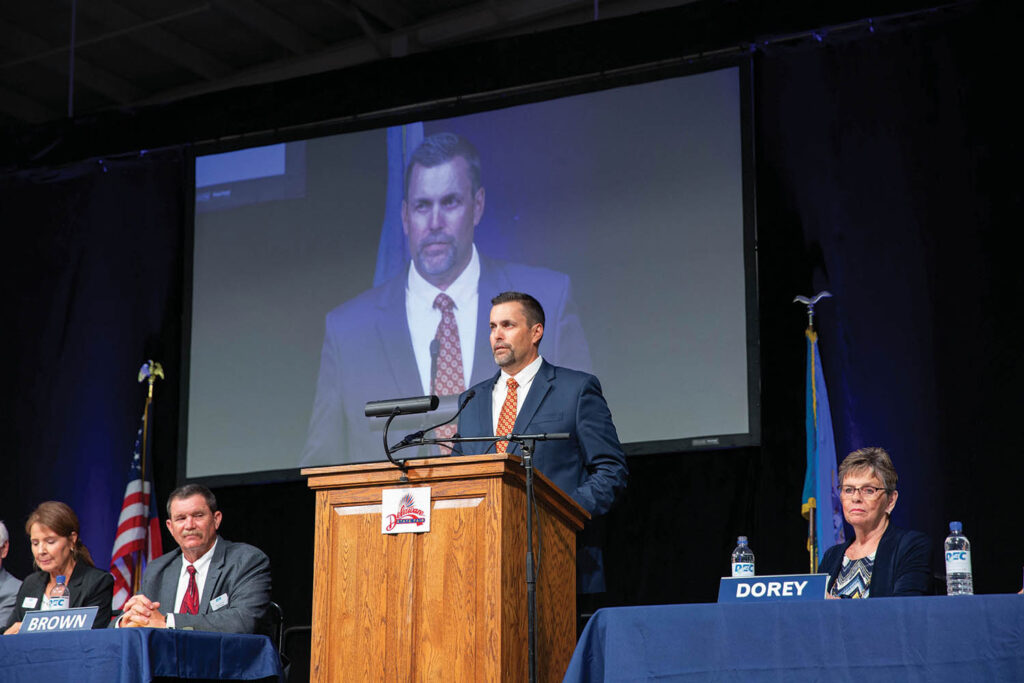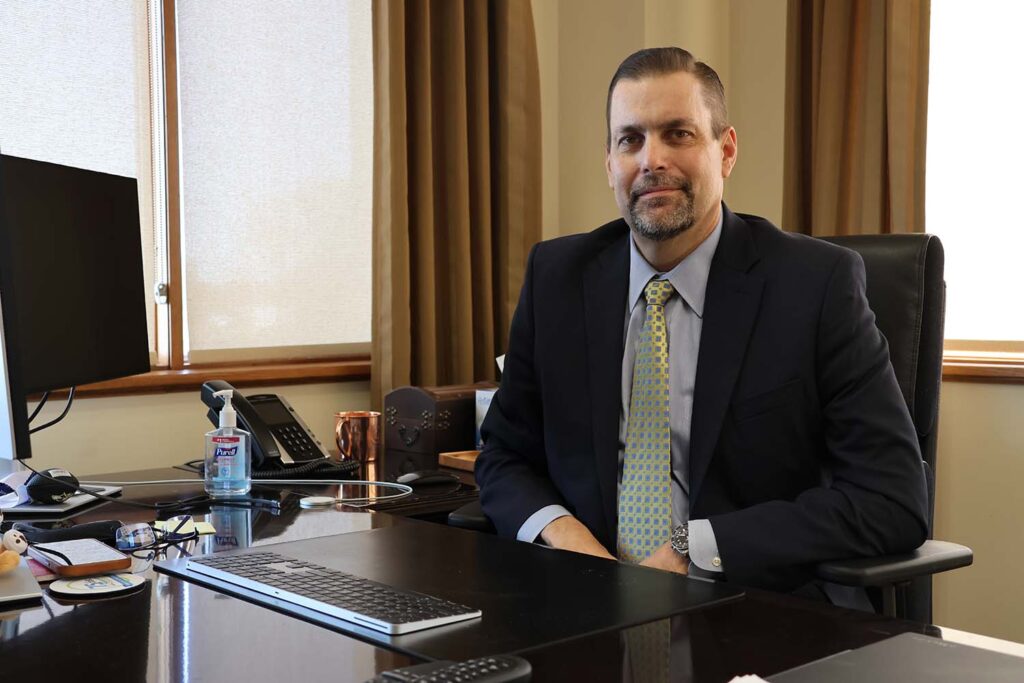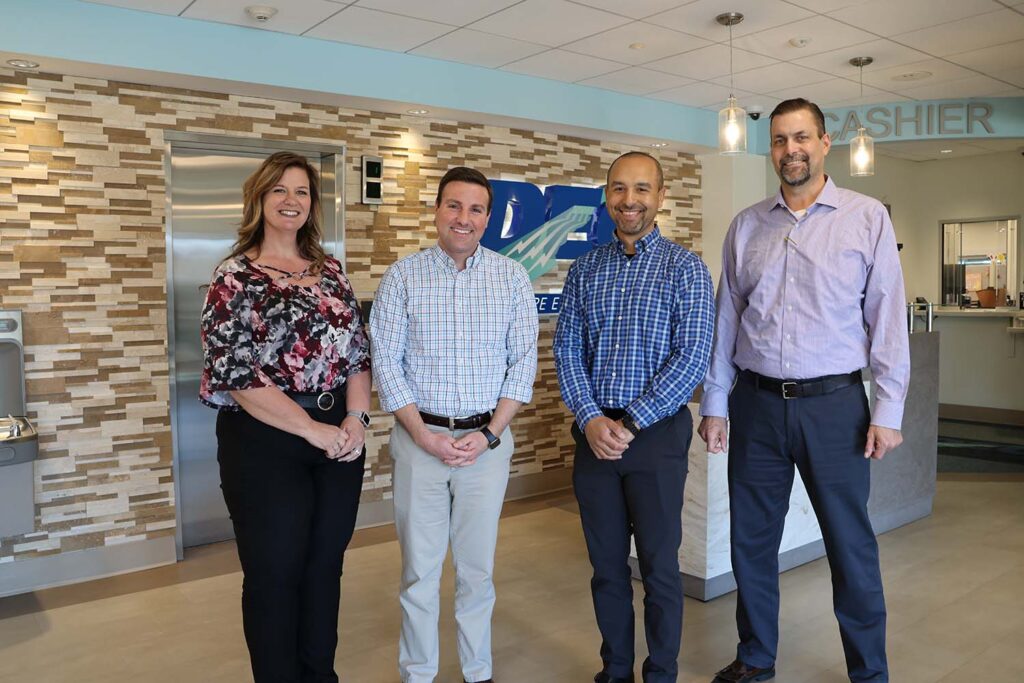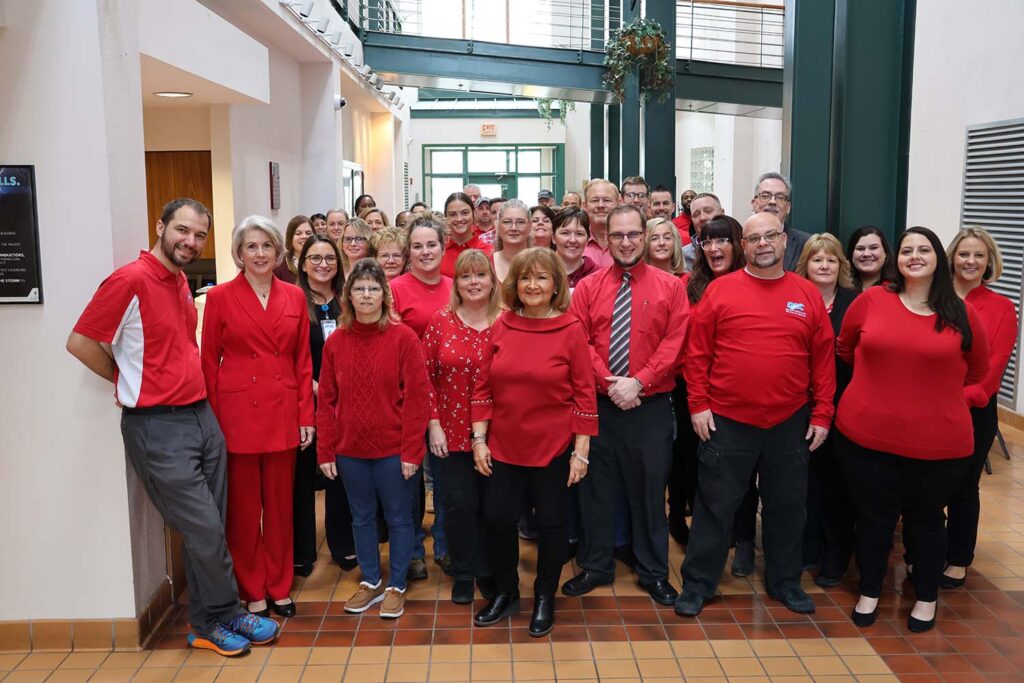
Rob Book has some new dates committed to memory, along with the normal store of birthdays, anniversaries and holidays. There is Nov. 4, the day he received his new heart. There is Dec. 4, the day he came home after 68 days in a hospital.
Then there is Feb. 7, the day the staff of Delaware Electric Cooperative welcomed its president and CEO back to the office.
There were few dry eyes in the house at the end of an emotional four months. That went double for Book as he stood in a truck bay and addressed employees who led prayer circles for him, cooked meals for his family and sent him so many well-wishes that he could barely sift through them.

“The thought of this co-op family coming together was just overwhelming to me for so long, I’m finally getting used to it,” Book said, reflecting on his homecoming. “That’s the kind of stuff that keeps you going. You’ve got a light at the end of the tunnel and that light is all these people that are pulling for you.”
Book is back in the office in Greenwood, Delaware, on a limited basis, and business at the fast-growing co-op is moving along. But if ever there was an example of the cooperative spirit supporting one of its own without skipping a beat in serving its members, this was it.
“We care about each other, and people were worried to death for a couple of months about his health and his ability to get back here,” said Jeremy Tucker, DEC’s manager of strategic communications and engagement. “So he walks through the doors, comes in and tells employees his story. It was an amazing day for us.”
‘When tragedy strikes one of us, we all feel it’
Book, 53, took over as CEO and president at DEC in November 2022 after more than 20 years in roles in government relations and member services, and as senior vice president. He seemed to be in good health, though he went through a procedure for atrial fibrillation to put his heart back in rhythm more than 20 years ago.
In May 2023, he noticed his health and energy deteriorating for reasons unrelated to running a 116,000-member co-op. A cardiologist put him on medications that got him through his first DEC annual meeting as CEO. When their effectiveness subsided, Book was scheduled for another procedure for atrial fibrillation on Sept. 26 at a Delaware hospital.

It never happened. During the procedure, physicians detected a blood clot. Book was admitted to the Hospital of the University of Pennsylvania, or UPenn. His heart failed while family, friends and DEC employees held their collective breath.
“He called me and he mentioned the words infection and heart in the same sentence, and that scared me,” said Patricia S. Dorey, chair of the DEC board, whose children went to school with Book’s wife. “Other co-ops cover a large land mass. Most of us know each other and we could drive to each other’s homes if we needed to, so it was very personal.”
After they ruled out other possibilities, Book said doctors attributed his heart failure to an infection of unknown origin. At UPenn, he suffered two cardiac arrests; after the first, it was clear that a heart transplant was his sole chance for long-term survival.
His heart was pumping out only about 8% of its circulating blood; normal is around 50%. Doctors placed him on machines that might buy him 30 days. Book was moved to the top of the heart transplant list. However, the donor had to be a suitable match within a 250-mile range of UPenn since the operation must be performed within four hours of the organ’s retrieval.
The cooperative swung into action on behalf of its leader, his wife, Kara, and their two daughters. DEC Operations Supervisor Josh Wharton organized a meal train so the family would have dinner ready when they returned from the hospital. Employees organized prayer circles, recorded video messages, and wrote cards and encouraging notes for Book. As Wharton said, “When tragedy strikes one of us, we all feel it.”
A core group of leaders steps up
At the same time, hard as it was, DEC had to keep the business running smoothly during budget reviews, rate considerations and campus improvements. There was no playbook to deal with a catastrophic leadership health crisis.
“After he had his cardiac episode, we realized that it was serious. This was life-threatening,” Tucker said. “We needed to figure out what we were going to do.”
Book provided part of the solution without knowing it at the time. When he was named CEO, he put together a senior advisory team of Dwayne Street, chief information officer; Dawn Smart, vice president for human resources; and Tucker, all of whom have been at DEC for 12 to 18 years.

That team became the guiding force for DEC with the input of Book, who was getting updates in his hospital bed. Book recommended that Street take over as chief operating officer. Dorey took the recommendation to the board and notified senior staff.
“We knew that we were a core group, and while we weren’t built for this specific moment, we were the ones that were going to have to tackle it,” Street said. “So I felt more ready for that side of it. The part I wasn’t ready for was the personal side that keeps you up at night, dealing with Rob, who has been a friend for so long.”
Smart said setting up a proper chain of communication was essential so neither Street nor Book would be bombarded with seemingly helpful advice from different quarters.
“We really had to learn to communicate better with one another to make sure everything was getting done and that we were communicating properly as a cooperative,” she said.
A texting system initially designed for emergencies and office closings kept DEC’s 180 employees updated on Book’s condition. The communications team kept members informed through social media and newsletters, creating another groundswell of support for Book’s fight.
Better every day
On Nov. 3, doctors told Book they had identified a match; he knows only the donor’s age. Doctors replaced his heart the next morning as DEC used the texting system to let employees know he had made it through the surgery. No serious complications arose, although Book spent another month at UPenn, missing more birthdays and Thanksgiving before being released to convalesce at home.
Fittingly, Book returned the office during National Heart Month. On Feb. 14, employees at DEC and across the Virginia, Maryland & Delaware Association of Electric Cooperatives wore red to honor Rob and his family and shared the photos on social media with the hashtag #Red4Rob.

Book is feeling better every day, though he lost more than 65 pounds through the ordeal and will be on medications for the rest of his life; he currently takes 26 pills a day. He is going to rehab and recently started progressing from the treadmill to light weight work. His immune system has to be compromised for his body to accept his new heart, so he can’t mingle in the hallways like he is accustomed to, but those restrictions should loosen in time.
Doctors got Book through the heart transplant, while members of the strategy team said the culture of openness and imagination that Book espoused got the co-op through the crisis. “We said, ‘We want to make sure that this place is in a better shape when he comes back than when he left,’” Street said. “The last thing he needs to be worried about is what’s going on here at Delaware Electric Co-op.”
A final lesson for anyone with a friend or family member in Book’s situation: Be an organ donor. It saved his life. According to the federal government, more than 103,000 people are awaiting transplantation and one donor alone can save as many as eight lives.
“There’s a network out there that we don’t realize until we’re in this situation,” Book said. “Being a transplant recipient, I will advocate for being a donor as well because it means so much.”
Steven Johnson is a contributing writer for NRECA.